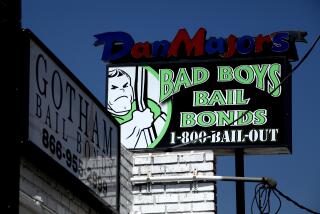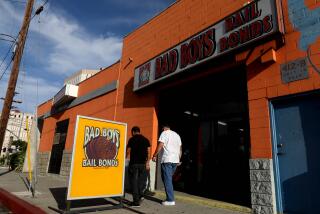Bailiffs--the Good, the Bad and the Indifferent--Make a Big Difference
- Share via
When an important case is about to go to trial, news reporters always think of the basics: Will this mess up my vacation? Will it be assigned to an interesting judge? Will I get a good bailiff?
Most deputy marshals in Orange County’s courtrooms are first rate. You just hate getting that rare bad one. Bad is defined here as grouchy, testy, lazy, uncooperative, cynical, moody--or as a nice person who just doesn’t happen to like reporters.
With so many courtrooms to be covered, reporters depend on bailiffs to save them enormous amounts of time. A quick telephone call can save an hour of your day between courts in Santa Ana and Newport Beach.
“You pick a jury yet?”
“Yeah, but no opening statements until Monday.”
Or:
“They put the defendant on yet?”
“He won’t make it today. Juror has a doctor’s appointment; we knock off at noon.”
These answers are lifesavers, unlike, for instance, “Hey, I don’t know nothin’, man,” or “You’ll have to call back after 4:30.”
This is not to say some bailiffs live to coddle reporters. Even the good ones let you know when you’ve been a pain just once too often.
My favorite bailiff is Jack Quinn, who now works for Superior Court Judge Richard J. Beacom. Quinn is like a lovable pet you’d give someone special for Christmas.
Judges adore him. Jurors always comment how helpful and pleasant he is. And reporters get no special treatment from Quinn. He usually nails us about the stories we’ve missed, or overplayed. But even murderers in court get respect from Quinn, and that’s all that any of us really wants.
Judges become attached to good bailiffs. Superior Court Judge David O. Carter thinks so much of Deputy Marshal Steve Scott that he makes sure Scotty goes with him any time he changes assignments.
And although bailiffs don’t always look busy, their job can be demanding. In the yearlong Randy Kraft serial-murder trial, Deputy Marshal Mitch Miller had his hands full: 20 jurors (counting alternates), a mountain of evidence to help watch, and a steady stream of traffic in and out of the spectator section. When lawyers would ask the court to check something in the statutes, Judge Donald A. McCartin would simply nod in Miller’s direction: “You got that, Mitch?”
And Miller was accommodating to reporters when to do so would not interfere with his work. He knew we had a job to do.
In fact, the only bailiff I’ve ever really disliked once substituted for Miller during the Kraft trial. Testimony ended early--at 2 p.m.--and he abruptly swept reporters and other spectators from the courtroom. Just five minutes, we asked. We had matters to check with the clerk. Nope, he said. Get out.
He always says that it’s for security. But I’ve been watching this guy for years. Truth is, his favorite pastime is propping his feet on the desk and taking it easy. I couldn’t wait for Miller’s return.
Bailiffs are also a jury’s lifeline to the system. Jurors have lots of questions and no one to turn to but the bailiff. I remember a day when jurors ordered to report at 9 a.m. had had to wait three hours in the hall while the judge and lawyers met privately. Finally, Deputy Marshall Rocky Galante opened the doors, announcing: “OK folks, it’s 9 o’clock.” The laughter it brought did a lot to ease the frustration.
I was steaming last week when a bailiff kept me out of a courtroom. It was after dark, and the judge had insisted that the lawyers keep working. The bailiff claimed it was a closed hearing. I knew better, and I verified the next day it had been open to the public. This guy just didn’t want the bother at a late hour.
But that incident made me think about the countless times bailiffs have put up with my telephone calls while jurors were deliberating, or took time to help me with a file when the clerk was away.
Maybe it takes a bad experience to remind you to treat all those good folks a little better.
More to Read
Sign up for Essential California
The most important California stories and recommendations in your inbox every morning.
You may occasionally receive promotional content from the Los Angeles Times.













